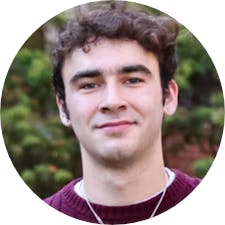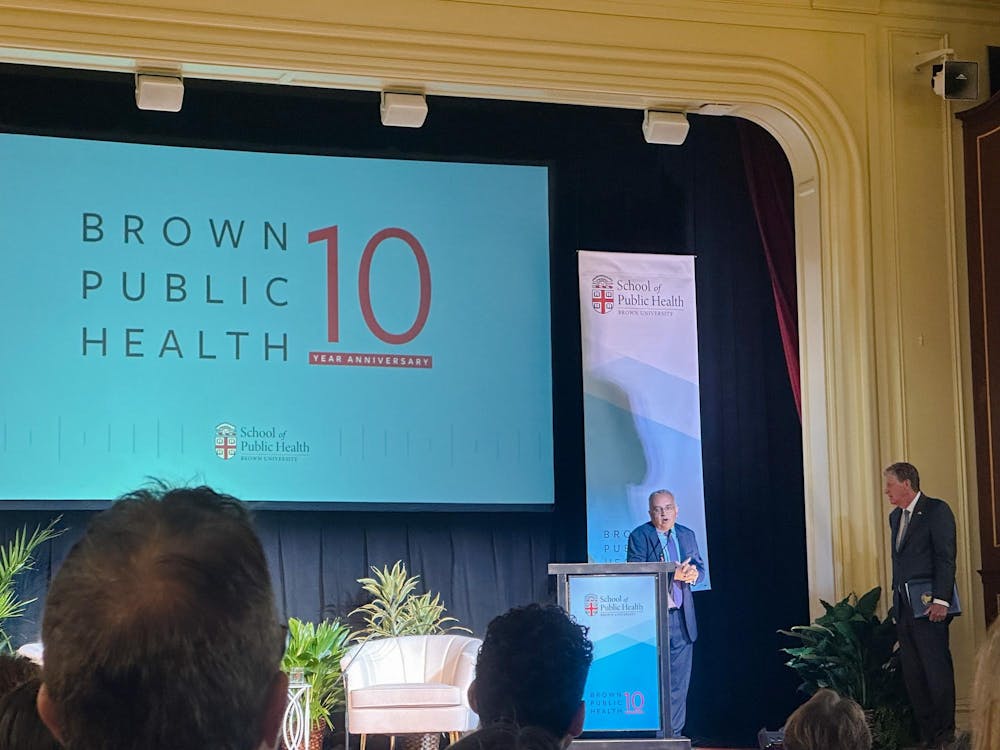With clinking glasses and fizzing champagne, the School of Public Health celebrated its 10-year anniversary in Alumnae Hall on Wednesday with a toast for its past, present and future.
Public health at Brown has a history that spans longer than 10 years — the Corporation, the University’s highest governing body, recommended a graduate program in public health over a century ago. “We could be celebrating the 107th anniversary of public health,” SPH Dean Ashish Jha said during his speech at the reception.
Governor Dan McKee, who worked closely with Jha during the COVID-19 pandemic, also spoke at the event. He issued a proclamation expressing “gratitude for (Jha and SPH’s) mission towards improving the health of all populations, especially those most vulnerable, by producing world-class public health scholarships, forging strong community partnerships and educating the next generation of diverse public health leaders.”
The reception featured what Chancellor Samuel Mencoff ’78 P’11 P’15 described as an “all-star cast” while introducing the keynote event: a conversation between Jha and President Christina Paxson P’19 P’MD’20.
During the discussion, the pair delved into the past and future of public health as SPH works to address the next wave of public health threats.
Paxson reflected on the creation of SPH, which she said “was not a hard decision … because of all the work that went into developing the plans” by previous faculty members.
Paxson and Jha both applauded SPH’s commitment to teaching at all levels, from undergraduates to Ph.D. students. They also praised the interdisciplinary nature of SPH, noting the many dual appointments held by its faculty members.
“Everybody talks about being multidisciplinary and interdisciplinary, (but) in most places it’s extremely hard,” Jha said. At Brown, however, interdisciplinary connections and dual appointments “are second nature.”
“If you think about the big, pressing problems, they are not going to be solved by people who work inside the classic structure of public health,” he added. “They are going to require people working across disciplines — between economics, sociology, human behavior, psychology, et cetera. We do that effortlessly.”
As SPH reaches a double-digit age, pressing and emerging public health threats remain a crucial focus.
“Climate change (is) probably the biggest public health threat over the next decade (and) next century,” Jha said. With the advent of climate-change-related threats, “we are going to see a lot more novel outbreaks regionally and globally” and they will require greater preparation, Jha added. In 2022, SPH opened the Pandemic Center to improve pandemic preparedness.
Jha also discussed misinformation and evidence, warning that the arrival of artificial intelligence could reshape public health. “AI is going to change the practice of public health in ways that we have not really thought about,” he said, adding that SPH ought to begin investing in research about AI.
In tandem with these issues, Jha also wants to diversify the face of American public health leadership. “While the public health workforce is quite diverse, the leadership of public health has not really reflected the experiences of people across America.”
Jha highlighted the Health Equity Scholars program, which offers scholarships and leadership experiences to those from historically underrepresented backgrounds, as an example of the SPH’s pursuit of this goal.
“One of the ways privilege perpetuates is through networks,” he said. The Health Equity Scholars program looks to not only train public health leaders but also “create a network of people who, after graduation, support each other (and) promote each other.”
When Paxson was asked what SPH would look like 10 years from now, she said, “If you ask people what are the top five schools of public health in the world, I want us to be one of them.”

Ryan Doherty is the managing editor of digital content and vice president of The Herald's 135th editorial board. He is a junior from Carmel, NY who is concentrating in chemistry and economics. He previously served as a university news and science & research editor, covering faculty and higher education.





